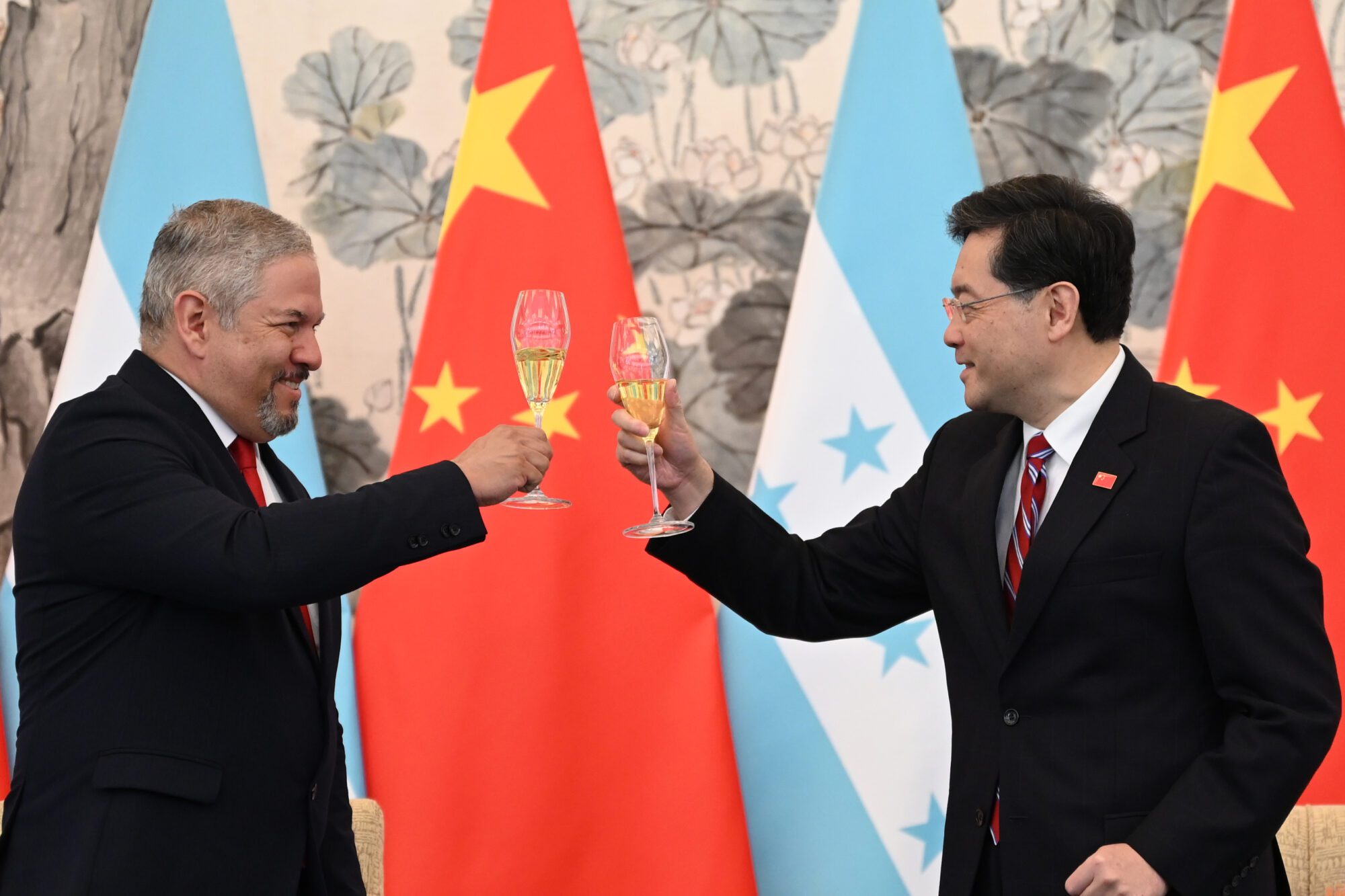
Honduras Foreign Minister Eduardo Enrique Reina (L) and Chinese Foreign Minister Qin Gang raise a toast following the establishment of diplomatic relations between the two countries, at a ceremony in the Diaoyutai State Guesthouse in Beijing on March 26, 2023.
Honduras, having recently severed long-standing diplomatic relations with Taiwan, promptly established new ones with China.
A joint communiqué, released on Sunday, March 26th and signed by both nations’ foreign ministers, formalized the decision.
In the communiqué, both diplomats—China’s Qin Gang and Honduras’ Eduardo Enrique Reina—agreed “to develop friendly relations” based on the “principles of mutual respect for sovereignty and territorial integrity, mutual non-aggression, non-interference in each other’s internal affairs, equality, mutual benefit and peaceful coexistence.”
Beijing’s diplomatic recognition requires the Central American country to align with the claim that it is “the sole legal Government representing the whole of China,” and that Taiwan, which Beijing considers a renegade province, is “an inalienable part of China’s territory.”
Under Beijing’s One China policy, it does not allow countries to recognise both Beijing and Taipei.
Earlier, Reina said that upon Castro’s instructions he had “communicated to Taiwan the decision to cease diplomatic relations,” which Honduras had maintained with Taiwan since the 1940s.
For Beijing, it marks the latest in a string of recent diplomatic victories.
That same day, Taiwan confirmed breaking off relations with Honduras. It also removed the flag of the Central American country from Taiwan’s Foreign Ministry. Taiwan’s ambassador to the country had already been recalled.Taiwan’s Foreign Minister, Joseph Wu, has accused China of offering “financial incentives” to lure away Taiwan’s allies, saying that Castro’s government had “demanded we provide billions of U.S. dollars in financial aid,” and “compared prices for assistance programmes provided by Taiwan and China.” Honduras, Wu said, had asked Taiwan to pay $90 million for a hospital and $350 million for a dam, and to forgive $2 billion in debt, which “felt like what they wanted was money.”
In a copy of a letter seen by Reuters, Honduran Foreign Minister Eduardo Enrique Reina had written to Taiwan this month, asking for almost $2.5 billion in aid, including a loan of $2 billion to help write off debt, as well as funds for the construction of a hospital and a dam.
China’s foreign ministry spokesperson Mao Ning addressed the issue of payouts. He told a regular news briefing on Monday that no conditions were attached to the deal. “Diplomatic ties are not something for trade,” he said.
Taiwanese President Tsai Ing-wen laid out her own view on the matter, stressing her government “would not engage in a meaningless contest of ‘dollar diplomacy’ with China.” She accused Beijing of using “pressure and coercion” to “suppress Taiwan’s international participation.” She emphasized that China’s “military intimidations against Taiwan” was disrupting “regional peace and stability,” adding defiantly that they would “not give in to threats.” Taiwan “will only expand and grow stronger,” she continued, referring to her country’s “connections and cooperation” with diplomatic allies and its “joint efforts to advance international security and well-being.”
While it respected the sovereignty of Honduras in making its decision, the U.S. State Department said it was important to note China “often makes promises in exchange for diplomatic recognition that ultimately remain unfulfilled,” and that “regardless of Honduras’ decision, the U.S. will continue to deepen and expand our engagement with Taiwan.” In addition to the two Central American countries, Tsai will be making stopovers in New York and Los Angeles.
With one less diplomatic ally, Taiwan is becoming increasingly isolated. With this latest setback, only 13 countries still recognise the beleaguered island’s sovereignty.
In recent years, it has lost the diplomatic recognition of several Latin American countries, such as Nicaragua, El Salvador, Panama, the Dominican Republic, and Costa Rica, to China’s enticements.
